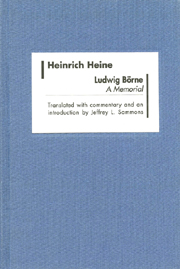Introduction
Published online by Cambridge University Press: 05 February 2013
Summary
In August 1840, the forty-two-year-old German poet and culturalpolitical writer of Jewish origin, Heinrich Heine, in de facto if not quite de jure exile in Paris, published a book about the German political writer of Jewish origin, Ludwig Börne, who had died, in de facto exile in Paris, three years before at the age of fifty. Regarded by Heine and by others since as his best written book, it was also his most disastrously conceived. It was intended to establish credentials of a revolutionary vision profounder than Börne's politics of radical agitation and to recover the high ground of revolutionary principle and philosophy against the attacks upon him that Börne had mounted in his last years and that had remained influential with segments of the German public. The effect was quite the opposite. The book was met by a storm of outrage, dwarfing anything seen before in Heine's contentious and polemical career. A compilation of critiques of Heine published from July 1840 until December 1841, most of them hostile responses to Börne, contains 416 items filling 470 pages. Hardly a voice could be found that would venture a word in the book's defense; many of the German liberals and dissidents of the time were reinforced in their allegiance to Börne's memory. For a time it looked as though Heine's reputation would never recover from this debacle, and for decades it remained a segment, if a declining one, in the negative component of his reception history.
- Type
- Chapter
- Information
- Ludwig BörneA Memorial, pp. ix - xlPublisher: Boydell & BrewerPrint publication year: 2006

